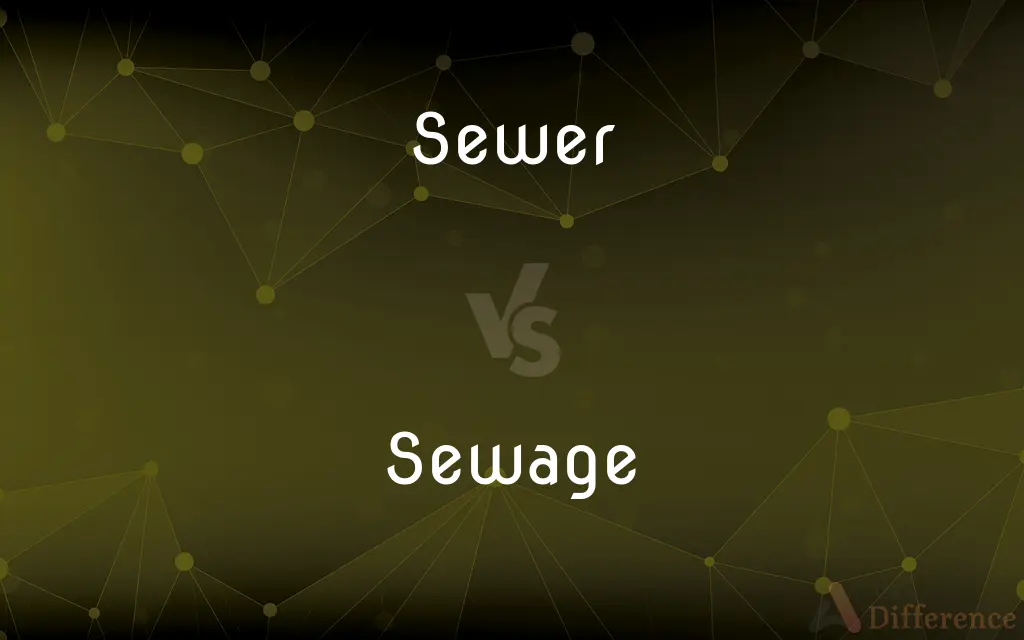Sewer vs. Sewage — What's the Difference?
Edited by Tayyaba Rehman — By Fiza Rafique — Updated on September 21, 2023
"Sewer" refers to the underground pipes or channels that carry waste and drainage water. "Sewage" refers to the waste and water that flows through sewers. Essentially, the sewer is the system, while sewage is what flows through it.

Difference Between Sewer and Sewage
Table of Contents
ADVERTISEMENT
Key Differences
The term "Sewer" generally refers to a network of pipes, drains, or channels designed for the purpose of carrying off waste and water from buildings to a treatment facility or outlet. "Sewage," on the other hand, denotes the actual waste material, often liquid, that travels through the sewer.
A "Sewer" can be made of different materials like concrete, metal, or plastic and can exist in various shapes and sizes. "Sewage" is often composed of human waste, kitchen waste, and other forms of runoff and is usually treated before being released into the environment.
"Sewer" networks may be private or public and can be situated underground or sometimes above ground in the case of stormwater systems. "Sewage" can be domestic or industrial, and its treatment often varies based on the pollutants it contains.
A "Sewer" system may include components like manholes, pump stations, and treatment plants. On the flip side, "Sewage" may undergo processes like sedimentation, biological treatment, and disinfection during its journey through a sewer system.
Both "Sewer" and "Sewage" are regulated by various local, state, and federal laws to ensure public health and environmental safety. However, the maintenance of a "Sewer" system and the treatment of "Sewage" often fall under different jurisdictions or departments.
ADVERTISEMENT
Comparison Chart
Part of Speech
Noun
Noun
Nature
Infrastructure
Material
Constituents
Pipes, drains, manholes
Human waste, water, debris
Regulatory Body
Local or state authorities
Environmental agencies
Location
Fixed, underground or above
Flows through sewers
Compare with Definitions
Sewer
Underground channel for waste and water.
The sewer system in the city needs an upgrade.
Sewage
Waste material in liquid form.
The sewage treatment plant cleans the waste before releasing it.
Sewer
Drainage system for waste removal.
The sewer handles both domestic and industrial waste.
Sewage
Combination of human waste and water.
Untreated sewage is hazardous to the environment.
Sewer
A pipe carrying waste materials.
The sewer line burst, causing a mess.
Sewage
Polluted water in drains.
Rainwater can mix with sewage, causing contamination.
Sewer
Conduit for stormwater.
The stormwater sewer prevents flooding.
Sewage
Industrial waste material.
Industrial sewage must be specially treated.
Sewer
Part of municipal infrastructure.
The town allocated funds for sewer maintenance.
Sewage
Sewage (or domestic sewage, domestic wastewater, municipal wastewater) is a type of wastewater that is produced by a community of people. It is characterized by volume or rate of flow, physical condition, chemical and toxic constituents, and its bacteriologic status (which organisms it contains and in what quantities).
Sewer
An artificial, usually underground conduit for carrying off sewage or rainwater.
Sewage
Liquid and solid waste carried off in sewers or drains.
Sewer
A medieval servant who supervised the serving of meals.
Sewage
A suspension of water and solid waste, transported by sewers to be disposed of or processed.
Sewer
One that sews
A sewer of fine clothing.
Sewage
(obsolete) sewerage.
Sewer
A pipe or system of pipes used to remove human waste and to provide drainage.
Sewage
The contents of a sewer or drain; refuse liquids or matter carried off by sewers
Sewer
A servant attending at a meal who is responsible for seating arrangements, serving dishes, etc.
Sewage
Sewerage, 2.
Sewer
One who sews.
Sewage
Waste matter carried away in sewers or drains
Sewer
A small tortricid moth, the larva of which sews together the edges of a leaf using silk.
Sewage
Kitchen and bathroom runoff.
The sewage system also handles kitchen waste.
Sewer
(transitive) To provide (a place) with a system of sewers.
Sewer
One who sews, or stitches.
Sewer
A small tortricid moth whose larva sews together the edges of a leaf by means of silk; as, the apple-leaf sewer (Phoxopteris nubeculana)
Sewer
A drain or passage to carry off water and filth under ground; a subterraneous channel, particularly in cities.
Sewer
Formerly, an upper servant, or household officer, who set on and removed the dishes at a feast, and who also brought water for the hands of the guests.
Then the sewerPoured water from a great and golden ewer,That from their hands to a silver caldron ran.
Sewer
A waste pipe that carries away sewage or surface water
Sewer
Someone who sews;
A sewer of fine gowns
Sewer
Misfortune resulting in lost effort or money;
His career was in the gutter
All that work went down the sewer
Pensions are in the toilet
Common Curiosities
Is Sewer a tangible object?
Yes, it refers to the physical pipes and drains.
Is Sewage a material?
Yes, it's the waste material that flows through sewers.
How do you maintain a Sewer?
Sewers are maintained by local or state authorities.
How is Sewage treated?
Sewage goes through various treatment processes at sewage plants.
What is a Sewer?
A sewer is an underground system of pipes that carries waste and water.
Is it illegal to dump into a Sewer?
Usually yes, unless it's designated for such use.
What is Sewage?
Sewage is the waste and water that flows through sewers.
Is Sewage always harmful?
Untreated sewage is generally harmful and needs treatment.
Do all buildings connect to a Sewer?
Most urban buildings do, but some rural ones may use septic tanks.
What can be found in a Sewer?
A sewer can contain pipes, drains, and sometimes manholes.
What makes up Sewage?
Sewage is usually a mix of human waste, water, and other debris.
Is Sewage ever recycled?
Treated sewage can sometimes be recycled for non-potable uses.
Is a Sewer different from a drain?
A drain is often a component of a larger sewer system.
What happens to untreated Sewage?
It can contaminate water sources and is generally harmful.
How is a Sewer built?
Usually with materials like concrete, metal, or plastic.
Share Your Discovery

Previous Comparison
Cellobiose vs. Maltose
Next Comparison
Classmate vs. ColleagueAuthor Spotlight
Written by
Fiza RafiqueFiza Rafique is a skilled content writer at AskDifference.com, where she meticulously refines and enhances written pieces. Drawing from her vast editorial expertise, Fiza ensures clarity, accuracy, and precision in every article. Passionate about language, she continually seeks to elevate the quality of content for readers worldwide.
Edited by
Tayyaba RehmanTayyaba Rehman is a distinguished writer, currently serving as a primary contributor to askdifference.com. As a researcher in semantics and etymology, Tayyaba's passion for the complexity of languages and their distinctions has found a perfect home on the platform. Tayyaba delves into the intricacies of language, distinguishing between commonly confused words and phrases, thereby providing clarity for readers worldwide.













































